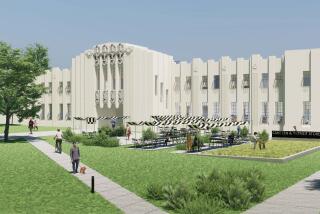War of Words Swirls Around Hotel Vote
PASADENA — The campaign to decide the fate of the historic Huntington Sheraton hotel has become a hairsplitting war of words that has sent both sides scurrying for their dictionaries.
On the surface, the issue in the May 19 referendum appears clear-cut: Should a zoning change that would let developer Lary Mielke demolish the hotel’s main building and replace it with a new building be allowed to stand?
But after only a few weeks of campaigning, both sides say that distortions, inaccuracies and legal jargon have obscured the issue to the point where no one is sure whether voters understand what a “yes” or a “no” vote means.
In the volley of charges between the Defenders of the Huntington Hotel, which opposes the project, and the Yes on the Huntington Hotel Committee, which supports it, the definition of a number of words, including “replica,” “preserve” and even “hotel,” has been debated.
Confusing Ballot
Further complicating the issue is the wording that will appear on the ballot, which both sides say is not only confusing but downright unintelligible.
The ballot, which under state law must follow the exact wording of the original zoning change, states:
“Shall Ordinance No. 6188, an ordinance of the city of Pasadena reclassifying the Huntington Hotel property located generally at the southeast corner of Oak Knoll Avenue and Wentworth Avenue, from RS-2 (Single-Family Residential, 20,000 square feet minimum lot area) and RS-2HD (Single-Family Residential, 20,000 square feet minimum lot area; Hillside Development Overlay District) to PD-15 (Planned Development 15), be adopted?”
A “yes” vote would approve the zoning change and allow Mielke to proceed with his project. A “no” vote would overturn the zoning change and stop the project.
“People are very confused,” said Ted Coleman, co-chairman of the Yes on the Huntington Hotel Committee.
Mielke said he has been meeting daily with civic groups interested in seeing his 30-minute presentation, which details the $38-million hotel project.
1,000 See Slide Show
Mielke shows “before” and “after” slides and answers questions. He said about 1,000 people have seen the presentation.
The harshest criticism has come from the Defenders of the Huntington Hotel, which recently has taken issue with Mielke’s use of the word “preserve.”
Mielke has made the word a cornerstone of his campaign, saying that although he intends to tear down the hotel’s six-story main building, the remaining 90% of the 20-acre complex, including the adjacent Viennese and Georgian ballrooms, the surrounding bungalows, and the Picture Bridge, would be restored or retained intact.
“I don’t know how anyone can say we’re not preserving it,” he said.
Deception Charged
But Kit-Bacon Gressitt, the Defenders’ campaign coordinator, contends that Mielke is using the word “preserve” in campaign brochures in an obvious attempt to mislead the public about the scope of his project.
Gressitt said Mielke plans to demolish, not preserve, the main building.
“It’s so obvious what they’re trying to do,” she said. “I’m infuriated.”
Gressitt said the problem with the use of the word “preserve” is complicated by differing interpretations of what is meant by the word “hotel.”
Gressitt said most people associate the Huntington “hotel” with the six-story main building, which she called the most important historical structure on the site.
“What’s worth preserving is exactly what they want to tear down,” she said. “I think it is an unfair propaganda campaign.”
But Mielke said the word “hotel” should encompass the entire 20-acre site, located in the city’s exclusive Oak Knoll neighborhood.
Beyond Repair
He said most residents associate the hotel with the public areas, including the ballrooms and the gardens, which will be preserved. The main building, he said, may be historically important, but is beyond repair.
He added that the Defenders’ fixation on saving the hotel’s main building has also misled the public about the entire project.
“They’re making it sound like the whole property is going to be taken down,” he said. “There is simply a lot of information that is not put on the table.”
To make matters worse, the two sides are also at odds on the meaning of the word “replica.”
Since he first proposed the hotel project last spring, Mielke has used the word “replica” to describe the 380-room structure that would replace the original 80-year-old main building.
The original building was closed in October, 1985, after engineering studies showed that it did not have the structural strength to withstand a major earthquake.
Webster’s New World Dictionary of the American Language defines a “replica” as a “very close reproduction or copy.”
Same General Appearance
Mielke contends that he intends to build a replica. Under his plan, the new building would have the same general appearance and finish as the existing building. In some cases, he says, it would look better because the new building would not have the unsightly exterior pipes and air conditioning units that have been added to the original structure.
The interior would be modern and have larger rooms, bringing the hotel up to what Mielke called “four-star” standards.
But Mielke’s opponents have objected to the use of the word “replica,” which they say is misleading because the new building would not be the same, especially inside.
Gressitt added that even if the new building was indistinguishable from the current building, a copy would not be an adequate substitute for a historically important structure.
‘Should Not Be Replicated’
“For me the whole thing is a problem,” she said. “They want to replicate something that should not be replicated in the first place.”
Mielke said his group decided to use the word “preserve” instead of “replica” in its campaign brochure because the word “means different things to different people.”
But he said he still uses “replica” in describing his project and called the semantic debate “pretty childish.”
“We’re trying to be precise,” he said. “But they just want to argue about words, not plans.”
Source of Confusion
James M. Galbraith, one of four partners of Huntington Hotel Associates, which will own the hotel property, said that much of the confusion about the hotel can be traced to the petition drive that forced the Board of Directors to schedule the May 19 referendum.
Under state law, residents can challenge a decision by their city government in a referendum if they can show the support of at least 10% of the city’s registered voters.
The Defenders’ petition was presented with a two-page copy of the city ordinance approving the zoning change. The wording had to be exactly the same as that of the ordinance, but both sides agree it was so difficult to understand that most people relied on the people gathering the signatures to explain the issue.
Galbraith said some of the explanations exaggerated the issues or included inaccurate information.
“Their entire campaign was handled in a way in which it didn’t matter what they said as long as they got a signature,” Galbraith said.
Defends Presentations
Gressitt conceded that only a few people read the petition, but said that those gathering signatures made informative and accurate presentations.
“Besides, everyone knew right away what we were talking about,” she said.
Galbraith said that voters who have followed the issue will be able to sort through the confusion by election time.
“I think there is a high degree of recognition of the issue,” Mielke said. “I don’t think there is as much confusion as people allege.”
Worried About Voters
But Mielke conceded he is worried that despite numerous meetings with residents, many voters may become confused when they get into the voting booth and read the ballot.
The opposition agrees that the ballot wording is confusing. “It’s kind of meaningless,” Gressitt said. “I mean, Ordinance 6188, so what? What’s that?”
Both groups have spent the last few weeks meeting with various neighborhood and civic groups to clarify their positions and make sure the public understands that a “yes” vote will allow Mielke’s project and a “no” vote will stop it.
“I hope people will know the difference,” Mielke said. “We are spending a lot of time making sure people understand what they are voting for.”
Gressitt added, “Getting the vote out will be the big issue. If voters only see the ballot, we may have one of the lowest voter turnouts in history.”
More to Read
Sign up for Essential California
The most important California stories and recommendations in your inbox every morning.
You may occasionally receive promotional content from the Los Angeles Times.











